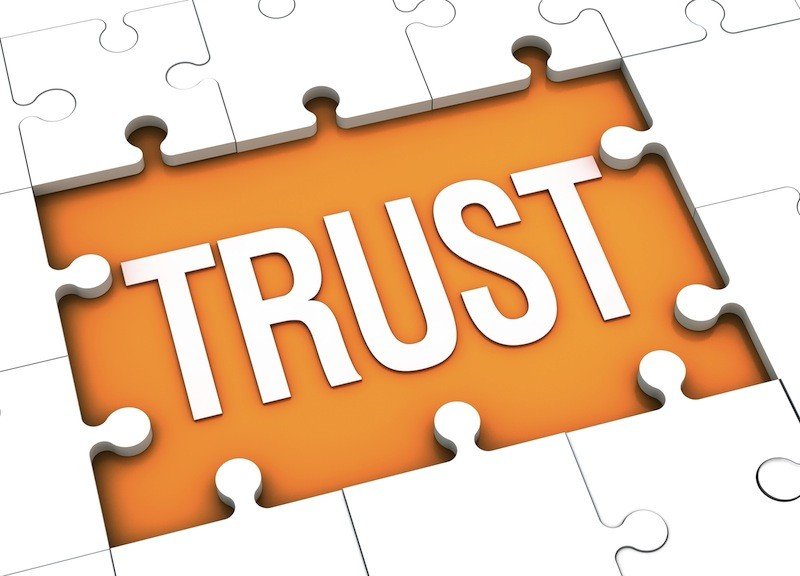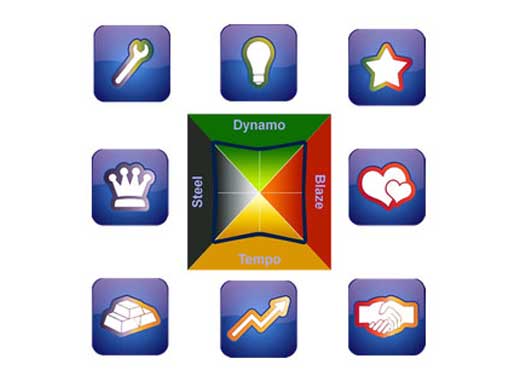
by Julia Felton | Feb 27, 2013
Trust is the unwritten social contract that underpins everything in our society. We all know how it feels when trust is broken or lost. More importantly we all understand what the effects of a loss of trust can be.
Yet trust allows us to great things. Through trust we can work together effectively. We can rely on our friends and family. We can speed up communication and action.
All because of trust.
Trust in Business
Trust relationships also cement every business activity. Trust in business exists through our external interactions with other organisations while internally it draws our business together. At the most basic level trust is needed for every employee contract or commercial transaction.
But trust in business is a much more vital concept in the 21st Century. As the certainties of the past are being undermined, economics and performance are being affected.
Is the concept of trust in your business a central part of your strategy?
The Meaning of Trust
Trust, in brief, is the confident expectation of something. Whether we are working at the highest level of a business or as an employee we all need to be confident in something in the future. We expect that our business will continue or our job will be safe.
Yet trust is sidelined as too ‘fuzzy’ to be measured or understood. It certainly can’t be applied. This simply is not true. We measure the effects of trust everyday.
What areas are affected by trust in business?
1. Turnover and Profit
2. Sales Performance
3. Referred Business
4. Employee Satisfaction and Engagement
5. Productivity
6. Project and Product Delivery
7. Customer Satisfaction and Loyalty
8. Brand Awareness and Marketing
The Measure of Trust
We can see the effect of trust but what would be the impact if we could go straight to the source and measure it directly?
It is safe to say that what and who we trust, we value. In business, what we value can be broken down into five different aspects.
What areas are affected by trust in business?
Innovation
Sometimes you need creative solutions and plans, ‘out of the box thinking’. Who do you value for this aspect? Chances are you trust them as well.
Communication
Every business needs good communication, internally and externally. The ability to listen and share information is a valuable skill and ability. Who do you trust most in this aspect?
Service
All businesses need to take care of the people that matter to them, whether that is team members or customers. Who do you rely on most to give excellent service?
Measurement
If we don’t know how we’ve done, how do we get better? Who do you lean on most for your measurement and reporting?
Spirit
This is the ability to stay resilient and positive. This is often the quality of leadership. Who do you trust to lead?
If a business or a team member loses their value in one of these aspects, it is easy to undermine what else they provide us. By assessing all five areas we can quickly become aware of where we have hidden, unused talent that can be unlocked.
If you want to learn more about TRUST and it’s importance in both the workplace and life you will not want to miss The Trust Conference. Book now to benefit from the early bird discounts
Julia Felton (aka The Business Wrangler) is the founder of Business HorsePower. Business leaders, entrepreneurs and executives hire her to accelerate their business performance by harnessing the energy of their people to work more collaboratively together. By aligning purpose with actions the team achieves exponential results as everyone starts pulling in the same direction.
Julia believes that business is a force for good and through designing purpose-driven businesses that leverage the laws of nature, and the herd, you can create businesses founded on the principles of connection, collaboration and community that make a significant impact in the world.

by Julia Felton | Feb 4, 2013
There are many types of leaders in any organisation and often the best leader is the one best suited for the job at hand. Now you know all about the eight different Talent Dynamics profiles you can then chose the leader suited for that job.
 Creators
Creators
Don’t expect a Creator to be the best people-person or a data-driven analyst. Creators lead best by setting the vision, a high standard to reach for and being task focused to reach their goals. To be in flow and avoid inevitable friction, a Creator needs a strong communicator to lead the team and a strong analyst to manage the numbers, or both the
people and the profit will suffer.
 Stars
Stars
Don’t expect a Star to wait for their team, or delight in the details (unless it is details on presentation and people). Stars strive for high standards and will often switch things at last moment to suit the occasion. Their leadership is by inspiration and leading from the front, so they need a strong Deal Maker to secure the connections and a strong number cruncher to count the dollars.
 Supporters
Supporters
Despite being one step away from the Star profile, the two are as different as thunder and lightning. Supporter profiles engender plenty of loyalty wherever they go, one of the Star profile’s greatest challenges. This is because while Stars generate hands-off admiration, Supporters attract hands-on motivation. Supporters are both intuitive and sensory which means that they can often act as the antenna for a more removed profile, leading by being the implementer from vision to action, through people.
 Deal Makers
Deal Makers
Deal Makers are ‘people people’ but they are more private than a Star and prefer to work one-to-one. Don’t expect Deal Makers to stick to a plan and expect them to come back from a meeting with a very different outcome than expected but a much better one. Deal Makers lead best when they are able to be in constant conversation with their ear to the ground, not isolated from the crowd or stuck in the back office.
 Traders
Traders
Traders struggle when given a blank sheet to fill but will quickly find the patterns in a puzzle. They find their flow when they grow a connection with their market and with their team. When they are taken out of this connection, it takes them time to tune back in and find their rhythm again. Traders lead far better through daily activity than long-term milestones and where they have ongoing input to inform their decision-making. All great Trader leaders lead from the middle of the action, which is the opposite of Creators, who do their best work when above the noise of the markets.
 Accumulators
Accumulators
Their analytical skills and sense of timing make Accumulators excellent project managers who will find the way to deliver what is needed on time. This ability to be extremely reliable has led many Accumulators up the ranks in areas that are not their passion. Many end up being faced with office politics, which they have little interest in and are ill equipped to handle. Accumulators lead best when they have the power to choose their team, as they will ensure that they only choose those reliable enough to get the job done.
 Lords
Lords
Lords are great at finding inefficiencies because they analyse the detail and stay in fanatical control. While this works for hard assets, it doesn’t work so well with people. For this reason, Lords are best at leading through the numbers instead of through conversation and collaboration. Lords almost always value process and policy over people, so take care in their position within a team and set them up for success using their strengths.
 Mechanics
Mechanics
Mechanics like to take things apart and put them together again. They are up to the challenge of changing the wheels on a moving car and as a result they are continually challenging the status quo on the way things are done. This can be very stimulating for some and very frustrating for others. Mechanics lead best by staying out of the fray and seeking ways to perfect a process or system and then have a team implement with thorough training.
Discover your leadership style by taking your Talent Dynamics Profile Test
Julia Felton (aka The Business Wrangler) is the founder of Business HorsePower. Business leaders, entrepreneurs and executives hire her to accelerate their business performance by harnessing the energy of their people to work more collaboratively together. By aligning purpose with actions the team achieves exponential results as everyone starts pulling in the same direction.
Julia believes that business is a force for good and through designing purpose-driven businesses that leverage the laws of nature, and the herd, you can create businesses founded on the principles of connection, collaboration and community that make a significant impact in the world.

by Julia Felton | Jan 29, 2013
Unbridle Your Success and Lead Your Business
Much like my horses a business needs good leadership and yet time and time again I see business owners struggling and frustrated as their business starts leading them.
You know your business is leading you when you are feeling:
- Overwhelmed with making a decision on how or what to do to move forward
- Frustrated at how stressful your business has really become
- Reactive to the opportunities that surround you rather than pro-active
- Stuck in an income bracket that you seem unable to break through
- Believe that the next level of success is maybe just too far out of reach
- Feel unbalanced, unorganized and incapable of taking it to the next step
- And most of all, you know you are working for the worst boss ever – YOU
It’s time to Grab the Reins and take control of your business and your life and pro-actively decide what is happening.
The first step to enable you to lead your business from surviving to thriving is to get your own personal success game plan, one that aligns with your natural strengths with the universal energies and gets you playing the game you love whilst working with others that love and excel at the bits you hate.
Great leaders know that “Success is a team game” and you need to surround yourself with herd members that complement your strengths. So what game do you need to play to be successful and who do you need in your herd?
”If you are doing anything that feels like hard work, you are already doing the wrong thing”
Do you think successful people know their personal success game plan…? You bet they do!
I am committed to helping more people. like you, discover their personal success game plan that resonates with your natural strengths and leadership style. So for a limited time – until the 8th February, you can get your personal success game for just £97 and as an extra special bonus I will offer you a 30 mins 1:1 personal consultation to get you started.
That’s a massive 50% discount on the normal price. You can learn more here.
You will receive your 16 page personal success report that details your personal success game plan based on your natural gifts and talents. And during our 30 min consultation we will look at the strategies and activities that will most naturally and easily help you stay in flow so that you can achieve more success in 2013.
So don’t delay click the button below and complete the online success questionnaire and your personalised success game plan will be immediately emailed to you. Then once you have read the report email me and we will schedule in your personal 1:1 success consultation.
Don’t delay, this could be the best decision you ever make to help you discover your personal success game plan for 2013.
I look forward to working with you to make 2013 your best year ever.
Julia Felton (aka The Business Wrangler) is the founder of Business HorsePower. Business leaders, entrepreneurs and executives hire her to accelerate their business performance by harnessing the energy of their people to work more collaboratively together. By aligning purpose with actions the team achieves exponential results as everyone starts pulling in the same direction.
Julia believes that business is a force for good and through designing purpose-driven businesses that leverage the laws of nature, and the herd, you can create businesses founded on the principles of connection, collaboration and community that make a significant impact in the world.

by Julia Felton | Jan 4, 2013
In the same way that trust has five aspects, flow also has five aspects. While we may trust a team member to be great at analysing the details, we may still feel their contribution will slow down the process and so we will avoid getting them involved.
Our talent grows when we deliver more value in the area we are most trusted, and we accelerate flow by mastering our ability to leverage that value.
In Talent Dynamics, there are five aspects of flow and each of them comes more naturally to each of the five frequencies. Here are the five aspects of flow:
Initiative
This is the degree to which your team experience that you consistently contribute your ideas and plans for improvement effectively such that they add to the success of the company. Dynamo frequency profiles naturally contribute the greatest flow in this area.
Respect
This is the degree to which your team experience that you consistently collect and share suggestions and feedback from customers and partners with the team for effective action, resolution and improvement. Blaze frequency profiles naturally contribute the greatest flow in this area.
Presence
This is the degree to which your team experience that you consistently invest the time to be present for the team, and to be proactive in seeking and finding solutions to improve the well being and harmony of the team. Tempo frequency profiles naturally contribute the greatest flow in this area.
Discipline
This is the degree to which your team experience that you consistently maintain a high level of caring and sharing in how you manage time, performance, measures and financial responsibility. Steel frequency profiles naturally contribute the greatest flow in this area.
Perseverance
This is the degree to which your team experience that you consistently work with the end in mind and find paths to success for the team and company without giving up. As each profile builds their awareness and mastery of their spirit frequency, they will contribute at increasingly higher levels in this area. This keeps the team in flow through every
season and the transitions between them.
The Talent Dynamics Barometer is a 360 degree review in which each team member receives feedback in each of these five factors of both trust and flow. From this, they gain visibility of the areas in which they can most rapidly grow sustainable value for the benefit of the team. The team as a whole also sees where they have the biggest gaps in trust and this will often inform them on the additions they need to make in the team to enable everyone to perform at a higher level.
Julia Felton (aka The Business Wrangler) is the founder of Business HorsePower. Business leaders, entrepreneurs and executives hire her to accelerate their business performance by harnessing the energy of their people to work more collaboratively together. By aligning purpose with actions the team achieves exponential results as everyone starts pulling in the same direction.
Julia believes that business is a force for good and through designing purpose-driven businesses that leverage the laws of nature, and the herd, you can create businesses founded on the principles of connection, collaboration and community that make a significant impact in the world.

by Julia Felton | Dec 20, 2012
When we hear a team member say of another team in the company “We can’t trust them with that” or a manager say to a team member “I don’t trust you with this task” we are hearing the word ‘trust’ used in a very explicit way. Yet trust (and distrust) shows up more often in invisible ways:
- A team member is given extra responsibility.
- A reorganisation moves some teams into more critical positions.
- Customers stop buying a particular product…
When we have a suspicion that trust has fallen, we may open up some conversations or make some enquiries but the dynamics of trust remain grey and cloudy. Within Talent Dynamics, the invisible becomes visible by recognising trust as having five distinct aspects. These aspects are all measurable and allow us to see where any individual, team and company are most trusted and least trusted. When we know this within a team, we can transform results rapidly by aligning activities to those we trust most in them and build the team to support each member where trust is lowest.
Here are the five aspects of trust:
Innovation
This is the degree to which your team trusts that you can be consistently relied on to come up with creative solutions and plans. Dynamo frequency profiles naturally create the most trust in this area.
Communication
This is the degree to which your team trusts that you can be consistently relied on to share information and listen effectively. Blaze
frequency profiles naturally create the most trust in this area.
Service
This is the degree to which your team trusts that you can be consistently relied on to look after customers and team members.
Tempo frequency profiles naturally create the most trust in this area.
Measurement
This is the degree to which your team trusts that you can be consistently relied on to measure and refine your own performance.
Steel frequency profiles naturally create the most trust in this area.
Spirit
This is the degree to which your team trusts that you can be consistently relied on to remain resilient and positive. Those who build
this on their path through their leadership naturally create the most trust in this area.
When we stop trusting a team member or an entire team to deliver in a particular area, we often let the factor in which we are not trusting them to overshadow any areas in which we do trust them and so throw out their strength with their weakness.
By assessing all five areas, we can quickly become aware of where we have hidden, unutilized talent just waiting to be unlocked.
We are excited that Stephen R. Covey will be the keynote speaker at the Talent Dynamics Trust Conference next year.
Want to discover your frequency. Take the Talent Dynamics Test here.
Julia Felton (aka The Business Wrangler) is the founder of Business HorsePower. Business leaders, entrepreneurs and executives hire her to accelerate their business performance by harnessing the energy of their people to work more collaboratively together. By aligning purpose with actions the team achieves exponential results as everyone starts pulling in the same direction.
Julia believes that business is a force for good and through designing purpose-driven businesses that leverage the laws of nature, and the herd, you can create businesses founded on the principles of connection, collaboration and community that make a significant impact in the world.

by Julia Felton | Dec 12, 2012
Team dynamics is one of the overlooked parts of a business. Yet it affects so much of a how a business operates, from the individual in the team to the company as a collection of teams to the entire market place.
If a team is out of sync or out of flow, things happen slowly or at worst not at all, accuracy levels decrease, absence increases, motivation is lacking and an unhealthy degree of competitiveness enters the workplace. The team members fail to trust one another. The team fails to work effectively. The business suffers. Does this problem sound familiar?
When looking at a business you need to identify areas where value and trust is lacking and how team work is being blocked. Imagine a team that worked well together, could anticipate each other and could back each other up. A team fully ‘in flow’. What economic impact would that have on your business or organisation?
Every person has something of value they bring to the team, a strength or a talent. This needs to be harnessed and encouraged to bring value to the team and increase the level of trust.
Julia Felton is an accredited Talent Dynamics Consultant and can help you improve and manage performance in your enterprise.
Julia Felton (aka The Business Wrangler) is the founder of Business HorsePower. Business leaders, entrepreneurs and executives hire her to accelerate their business performance by harnessing the energy of their people to work more collaboratively together. By aligning purpose with actions the team achieves exponential results as everyone starts pulling in the same direction.
Julia believes that business is a force for good and through designing purpose-driven businesses that leverage the laws of nature, and the herd, you can create businesses founded on the principles of connection, collaboration and community that make a significant impact in the world.

by Julia Felton | Dec 5, 2012
“Intention is comprised of our passion or desire to manifest. Intention has energy, it has life.”
– Ariana Strozzi, Horse Sense for the Leader Within
When the seemingly relentless demands at work and burdens of a busy life take their toll on work performance, we tend to think that managing our time better will improve the situation. If we can just work faster, multi-task more efficiently, things will be better, we think, as we buy the latest time management gadget or software.
However, as Jim Loehr and Tony Schwartz, authors of The Power of Full Engagement, explain, it is the skillful management of energy, not time, that most significantly affects high performance. Too often, we squander this valuable resource through energy-taxing habits—physical, emotional, mental and spiritual habits. Take this Self-Quiz to see how well you are managing your energy.
1. I rely on sugary or carbohydrate-rich snacks for bursts of energy when I need an energetic pick-me-up.
2. Life is an endless marathon to be endured; you just have to keep on running.
3. I tend to do what feels immediately pressing and easier to accomplish rather than make intentional choices about how I spend my time and what matters most.
4. I hate routines; they’re too much like being stuck in a rut. I prefer to be loose and spontaneous.
5. I’m so busy I rarely have time to reflect on what I value most deeply.
6. I seem to be stuck in overdrive; I feel like I’ve lost the ability to shift to any other gear.
7. I work out (cardiovascular and weight training) irregularly, if at all.
8. I regularly get less than six hours of sleep.
9. I rarely take breaks; that way, I can get more done.
10. When I take the time to notice, my breathing seems shallow; I seem to go a long time without taking a deep breath.
11. Anxiety, frustration and overwhelm seem ever-present for me.
12. When I’m under pressure, I easily become harsh or defensive with others.
13. Personal relationships are not something I devote a lot of energy to. If they don’t work, I move on.
14. I smoke and/or drink; to be honest, doing so really helps lower my anxiety level.
15. It’s been a long time since I’ve done something purely because it was enjoyable or felt good.
16. Downtime is wasted time.
If you answered “true” to more than just a few of these statements, you’re probably not performing—or feeling—as well as you could be. If you would like to explore how to live in a way that enhances your energy, not depletes it, then you need to be in flow. Please don’t hesitate to contact me so that I can help you discover your own secret recipe for putting energy and flow into your life.
Julia Felton (aka The Business Wrangler) is the founder of Business HorsePower. Business leaders, entrepreneurs and executives hire her to accelerate their business performance by harnessing the energy of their people to work more collaboratively together. By aligning purpose with actions the team achieves exponential results as everyone starts pulling in the same direction.
Julia believes that business is a force for good and through designing purpose-driven businesses that leverage the laws of nature, and the herd, you can create businesses founded on the principles of connection, collaboration and community that make a significant impact in the world.

by Julia Felton | Nov 28, 2012
A number of my clients always ask me what it feels like to be in flow and in this Ted video Mihaly Csikszentmihalyi explains that flow is the secret to happiness.
In summary when we are in flow the following occurs:
- Completely involved in what we are doing – focused and concentrating
- A sense of ecstasy – a sense of being outside everyday reality
- Greater inner clarity – knowing what needs to be done, and knowing how well we are doing
- Knowing that the activity is doable – that are skills are adequate to the task
- A sense of serenity – no worries about oneself, and a feeling of growing beyond the boundaries of the ego
- Timelessness – thoroughly focused on the present, hours seem to pass by in minutes
- Intrinsic motivation – whatever produces flow becomes it’s own reward
You can access the TED video here at:
http://www.ted.com/talks/mihaly_csikszentmihalyi_on_flow.html
So do you know when you are in flow and what your path to success looks like?. Imagine how easy success is when you are in flow. In you would like to discover your flow profile take the test here.
Julia Felton (aka The Business Wrangler) is the founder of Business HorsePower. Business leaders, entrepreneurs and executives hire her to accelerate their business performance by harnessing the energy of their people to work more collaboratively together. By aligning purpose with actions the team achieves exponential results as everyone starts pulling in the same direction.
Julia believes that business is a force for good and through designing purpose-driven businesses that leverage the laws of nature, and the herd, you can create businesses founded on the principles of connection, collaboration and community that make a significant impact in the world.

by Julia Felton | Nov 21, 2012
“The greatest source of unhappiness comes from inside.” —Jim Rohn
If you want to be a leader who attracts quality people, the key is to become a person of quality yourself. Leadership is the ability to attract someone to the gifts, skills, and opportunities you offer as an owner, as a manager, as a parent. I call leadership the great challenge of life.
What’s important in leadership is refining your skills. All great leaders keep working on themselves until they become effective. Here are some specifics:
Learn to be strong but not rude. It is an extra step you must take to become a powerful, capable leader with a wide range of reach. Some people mistake rudeness for strength. It’s not even a good substitute.
Learn to be kind but not weak. We must not mistake kindness for weakness. Kindness isn’t weak. Kindness is a certain type of strength. We must be kind enough to tell somebody the truth. We must be kind enough and considerate enough to lay it on the line. We must be kind enough to tell it like it is and not deal in delusion.
Learn to be bold but not a bully. It takes boldness to win the day. To build your influence, you’ve got to walk in front of your group. You’ve got to be willing to take the first arrow, tackle the first problem, discover the first sign of trouble.
You’ve got to learn to be humble, but not timid. You can’t get to the high life by being timid. Some people mistake timidity for humility. Humility is almost a God-like word. A sense of awe. A sense of wonder. An awareness of the human soul and spirit. An understanding that there is something unique about the human drama versus the rest of life. Humility is a grasp of the distance between us and the stars, yet having the feeling that we’re part of the stars. So humility is a virtue; but timidity is a disease. Timidity is an affliction. It can be cured, but it is a problem.
Be proud but not arrogant. It takes pride to win the day. It takes pride to build your ambition. It takes pride in community. It takes pride in cause, in accomplishment. But the key to becoming a good leader is being proud without being arrogant. In fact I believe the worst kind of arrogance is arrogance from ignorance. It’s when you don’t know that you don’t know. Now that kind of arrogance is intolerable. If someone is smart and arrogant, we can tolerate that. But if someone is ignorant and arrogant, that’s just too much to take.
Develop humor without folly. That’s important for a leader. In leadership, we learn that it’s okay to be witty, but not silly. It’s okay to be fun, but not foolish.
Lastly, deal in realities. Deal in truth. Save yourself the agony. Just accept life like it is. Life is unique. Some people call it tragic, but I’d like to think it’s unique. The whole drama of life is unique. It’s fascinating. And I’ve found that the skills that work well for one leader may not work at all for another. But the fundamental skills of leadership can be adapted to work well for just about everyone: at work, in the community, and at home.
Article by Jim Rohn
Julia Felton (aka The Business Wrangler) is the founder of Business HorsePower. Business leaders, entrepreneurs and executives hire her to accelerate their business performance by harnessing the energy of their people to work more collaboratively together. By aligning purpose with actions the team achieves exponential results as everyone starts pulling in the same direction.
Julia believes that business is a force for good and through designing purpose-driven businesses that leverage the laws of nature, and the herd, you can create businesses founded on the principles of connection, collaboration and community that make a significant impact in the world.

by Julia Felton | Nov 14, 2012
I came across this 1928 article (anonymous) called ‘10 Ways to Kill a Team’. I smiled as a I read it and thought you’d enjoy:
- Don’t go to team meetings. Complain about the inconvenience of scheduling – place – time.
- If you do go, go late and offer a creative excuse. Do create distractions when arriving.
- If the weather doesn’t suit you, don’t even think of going. It’s not convenient anyway.
- If you attend, find subtle fault with the work of the team leader and team members.
- Never accept leadership as it is easier to criticise than to do things and take the heat.
- Get sore if you are not appointed to special teams, but if you are, don’t participate.
- If asked by the team leader for your opinion, don’t give it – complain after the meeting.
- Do the minimum, when others jump in to help, complain that a clique runs the team.
- Don’t pay your dues or coffee / birthday / anniversary fund collections, or pay very late.
- Don’t recruit new members, “Let George do it”. Complain about quality and production.
Do you know anyone who does these things?!
If any of these resonate then I would strongly urge you to look at your team and how to engage them in your business. One great way to do this is to get your team members to take a Talent Dynamics profile test. You can take the test here.
Julia Felton (aka The Business Wrangler) is the founder of Business HorsePower. Business leaders, entrepreneurs and executives hire her to accelerate their business performance by harnessing the energy of their people to work more collaboratively together. By aligning purpose with actions the team achieves exponential results as everyone starts pulling in the same direction.
Julia believes that business is a force for good and through designing purpose-driven businesses that leverage the laws of nature, and the herd, you can create businesses founded on the principles of connection, collaboration and community that make a significant impact in the world.





















